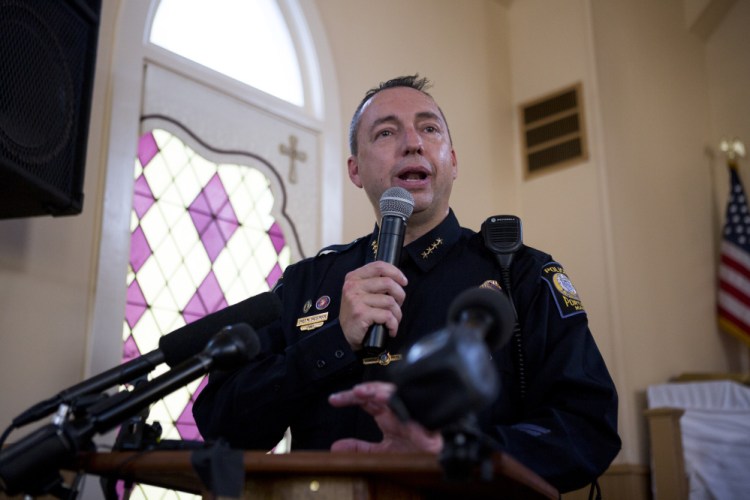For me, the most important speaker at the “make a commitment to peace” service last week at Green Memorial AME Zion Church was not a member of the clergy.
As people gathered on a hot night to mourn two African American men who had been shot to death by police and five police officers in Dallas who had been gunned down by a sniper, the speaker who seemed to best capture the spirit of the moment was a cop, Portland Police Chief Mike Sauschuck.
“We’ve got a long way to go as a society,” Sauschuck said. “As a department, I pledge to you that we’re going to continue to work forward. We need to do better. … We can’t do anything by ourselves. I truly need you to work with us in partnership, hand in hand, as we move forward as a community. It takes two to tango and I’m here to dance.”
At a time when people are screaming to be heard, Sauschuck’s calm, quiet voice rang out. His invitation to dialogue was exactly the right response to people standing on opposite sides of a gulf of anger and fear.
And his willingness to accept even a small part of the responsibility for the horrendous situation facing the country should be a challenge to the rest of us: How much of the blame will we accept, and what are we going to do about it?
Because the problem is not – as protesters chanted last Friday – “racist police.” That would be easy to fix. Just identify the bad cops and get them off the street.
The real problem is the unconscious bias that is baked into all of our institutions and bubbles up wherever decisions are made.
Until the leaders in business, politics, education, religion and the media are ready to show the kind of leadership that Sauschuck is showing, how can we ever expect to make any progress?
Since Sauschuck’s remarks last week, things have gotten even worse. Another deranged loner with a rifle has killed three more officers, this time in Baton Rouge, Louisiana.
That can only add to the stress that complicates every interaction between a police officer and a stranger.
On Monday, Sauschuck said he wants his officers to protect themselves, but he reminds them not to let potential danger force them into a defensive crouch. He wants them to connect with the people they meet as individuals and not to treat them as members of a group.
Unlike some defenders of the police, Sauschuck won’t try to use statistics to prove that there is no difference between the way whites and minorities are treated. “When you look at the disproportionate minority contacts with the criminal justice system, those numbers speak for themselves,” Sauschuck said.
As to what causes that discrepancy, he said he has more questions than answers.
“My questions come from what we see on the street. The people we are arresting are suffering from substance use. They are suffering from mental illness. They are suffering from poverty. I do believe that bias plays some role, but we are not arresting hundreds of thousands of people a year based on racial bias (alone).”
Those are problems that policing can’t fix. They are social ills that demand political remedies. Citizens have to make them priorities and hold their elected officials accountable if they don’t act.
That would take some new thinking, but Sauschuck says, he’s seen attitudes change quickly. The “War on Drugs” approach is now seen as a “complete and utter failure,” he said, and police are working with treatment providers in ways that they never would have imagined even a few years ago. People who until recently were considered prostitutes and guilty of a crime are now seen as victims of sex trafficking, and can help the police make cases.
“We have to collaborate – if people don’t call us, we can’t do anything,” he said.
None of this should suggest that everything is perfect in Portland or even that it’s good enough.
The protesters who shut down Commercial Street last Friday make a legitimate claim that people of color do not feel like full members of the community – that their lives don’t matter.
But blaming cops on the street for racism is like blaming the grunts in Vietnam for America’s Asia policy in the Cold War. The ultimate responsibility belongs to us all.
It can give you hope to see a community leader like Sauschuck willing to stand up and commit his organization to do better. Let’s hope he’s not left out on the dance floor all by himself.
Send questions/comments to the editors.




Comments are no longer available on this story